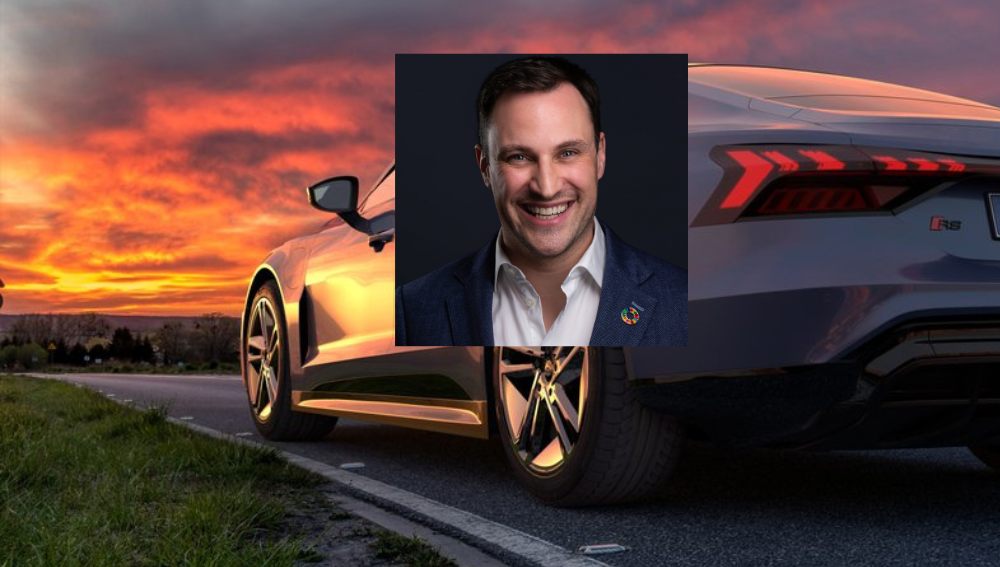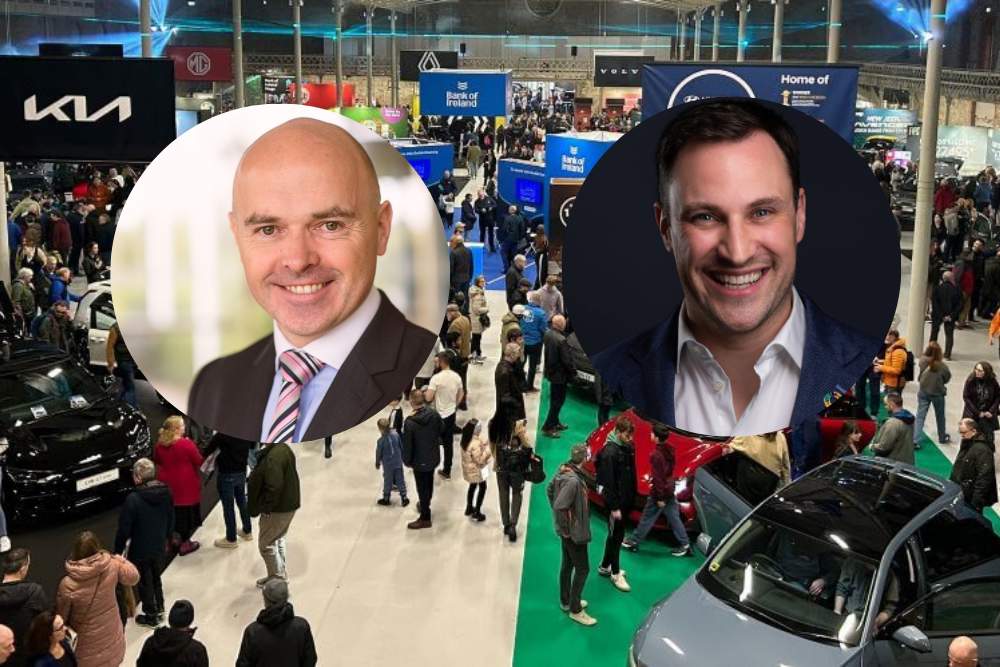Podcast Ep 280: Ahead of the Nevo Electric Vehicle Show on 7 and 8 November, we speak to Nevo’s Derek Reilly and Bank of Ireland’s Derek Kavanagh about how Ireland’s electric fleet revolution is gaining momentum among businesses.
Ireland’s business landscape is beginning to embrace electric vehicle technology at unprecedented rates. With light commercial vehicle sales surging 112% year-on-year, according to SIMI, just as private motorists have found, businesses are beginning to discover how the economics of fleet electrification can deliver substantial operational savings.
The transformation is being driven by compelling financial mathematics. Derek Kavanagh, head of Motor Finance at Bank of Ireland, who has himself made the switch to electric, calculates that charging his 84kW vehicle for 520 kilometres costs just €11 compared to equivalent petrol or diesel expenses.
“We’re getting to the stage where range won’t be a factor”
“Electric vehicles have fewer moving parts,” Kavanagh explains. “If you have fewer moving parts, they’re not likely to cost as much with service and repairs. I think a key consideration for any company looking at fleet transition is to do a proper analysis and look at the total cost of ownership.”
EV ownership powers ahead in Ireland
-
You can also listen to the Podcast on:
-
Spotify
-
SoundCloud
-
Apple
“Making the transition as easy as possible for employees is crucial. This includes helping with home charger installations and ensuring workplace charging availability”
We spoke with Kavanagh and Derek Reilly, director of Nevo, ahead of the Nevo Electric Vehicle Show at the RDS in Dublin on 7 and 8 November. The first day of the Nevo Show on 7 November will be a business-only event aimed at equipping business owners with the knowledge to begin electrifying their fleets while the second day on 8 November will be open to the general public who can check out all the latest vehicles in the market or about to hit Irish roads.
The cost advantage of EVs is materialising as Ireland’s overall electric vehicle market experiences robust growth, with EV sales climbing 37% year-on-year to represent nearly 22,000 of the 120,000 passenger vehicles sold domestically. The figures suggest Irish businesses are moving beyond initial scepticism about electric vehicle viability.
Derek Reilly observes that adoption barriers are gradually dissolving. “Four out of five people are still hedging their bets,” he notes. “So it’s all down to education. We want to make sure that they have all the information so they understand what they’re getting themselves into.”
The infrastructure supporting this transition has expanded rapidly, with over 100 planning applications currently under consideration for charging hubs across Ireland. These developments extend beyond simple charging points to encompass comprehensive service destinations, including integration with retail facilities and sports clubs.
Technological advances are addressing previous concerns about vehicle capability. Recent testing has achieved world records exceeding 1,200 kilometres on a single charge, while average ranges now reach 450-500 kilometres. Even heavy goods vehicles are demonstrating substantial progress, with Mercedes-Benz’s new e-Actros achieving 600 kilometres with full loads.
“We’re getting to the stage where range won’t be a factor,” Reilly states. “It’s really not a factor once you go electric.”
The transition requires comprehensive planning beyond vehicle procurement. Successful implementation demands attention to charging infrastructure, both at business premises and employee residences. Approximately 80%of EV charging occurs at home, making residential charging solutions crucial for fleet effectiveness.
“Making the transition as easy as possible for employees is crucial,” Kavanagh emphasises. “This includes helping with home charger installations and ensuring workplace charging availability.”
The business case for going electric
Corporate engagement with electric vehicle technology is expanding beyond basic transportation. Companies are increasingly considering integrated energy solutions, including solar power installations, vehicle-to-grid capabilities, and comprehensive battery storage systems.
The business case for electrification extends beyond operational costs to encompass sustainability objectives. Companies face growing pressure to reduce carbon emissions, with fleet electrification representing one of the most significant available interventions for businesses operating substantial vehicle fleets.
Industry specialists advocate learning from early adopters rather than developing independent solutions. “You shouldn’t have to reinvent the wheel,” Reilly advises. “There’s somebody out there that has gone through the hoops already, and you can learn from them.”
The Nevo Electric Vehicle Show, returning to Dublin’s RDS on 7 and 8 November, reflects this growing business interest by dedicating its Friday programme exclusively to fleet and commercial applications. The event expects 5,000-10,000 business attendees, alongside 20,000-25,000 consumers on Saturday.
Reilly said that the November event will be bigger and better than previous Nevo shows. “So last year, we had a target of 25,000 registrations, which we hit, and we were just under 19,400 so that was on the general public day. So we’re looking to aim between 20,000 and 25,000 on the Saturday, and then on the Friday, we’re aiming between 5,000 and 10,000 businesses to come through the doors over the day. So big numbers, big targets to hit, but the fact is that it’s free to attend and you can register on Nevo today. Some of the conferences that are out there cost hundreds of euros to go along to them. So we’re saying, ‘You know what? Let’s take away that cost barrier.’ People can go in and look, touch, feel, ask the questions, go to the attendance stage. You can come along to my delay demos. You can take a test drive, book, a test drive in advance, so there’s lots of positives to it.”
Financial institutions are adapting their services to support this electric transition. Kavanagh said that Bank of Ireland now works with 16 main franchise brands across the Republic of Ireland, offering financing solutions that encompass both vehicle acquisition and charging infrastructure development.
Kavanagh explained: “What we are seeing internally in Bank of Ireland is the definitive increase year on year in the growth, whether that’s from the consumer aspect of it or from the private businesses purchasing light commercial vehicles. I think where ever we can assist, whether it’s a consumer or whether we can assist a business, we will.
“On each day, we’ll have a team of leading finance experts Nevo Electric Vehicle Show to help, whether it’s somebody interested in funding one vehicle or a fleet, or looking to see how Bank of Ireland can support that business with, I suppose, the full package from cradle to grave. So if they need funding solely for the vehicles, or if they need funding for the infrastructure, the charging infrastructure, etc, we’ll have people on the ground to assist and support that customer as best we can.”
Reilly said the emergence of purpose-built electric commercial vehicles represents a significant development. Manufacturers including Kia are launching dedicated electric van platforms designed specifically for battery integration, rather than retrofitting existing internal combustion engine designs.
This technological evolution suggests Irish businesses are positioned to benefit from increasingly sophisticated electric vehicle solutions. All will be revealed on 7 and 8 November.
-
Bank of Ireland is welcoming new customers every day – funding investments, working capital and expansions across multiple sectors. To learn more, click here
-
For support in challenging times, click here
-
Listen to the ThinkBusiness Podcast for business insights and inspiration. All episodes are here. You can also listen to the Podcast on:
-
Spotify
-
SoundCloud
-
Apple





